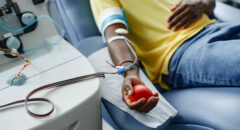
Rapper Albert “Prodigy” Johnson, who brought us ’90s hits like “Shook Ones, Part II”, “Quiet Storm” and more died on June 20, 2017. He was only 42. This year would have been his 50th birthday. But it’s not just his young age that was shocking to a lot of people, it’s the cause of death that made people take notice and start doing their own research.
He suffered from health issues throughout his life, including sickle cell anemia, however there are some who still argue about his true cause of death. Sickle cell anaemia is a condition in which red blood cells contort into a sickle shape and die early, leaving a shortage of healthy red blood cells. The condition can lead to a painful blockage of blood flow.
“It is with extreme sadness and disbelief that we confirm the death of our dear friend Albert Johnson, better known to millions of fans as Prodigy of legendary NY rap duo Mobb Deep”, his publicist said in a statement. “Prodigy was hospitalized in Vegas after a Mobb Deep performance for complications caused by a sickle cell anaemia crisis. As most of his fans know, Prodigy battled the disease since birth. We would like to thank everyone for respecting the family’s privacy at this time.”
People who have sickle cell disease have abnormal hemoglobin, called hemoglobin S or sickle hemoglobin, in their red blood cells. Hemoglobin is a protein in red blood cells that carries oxygen throughout the body.
In sickle cell anemia, the red blood cells become rigid and sticky and are shaped like sickles or crescent moons. These irregularly shaped cells can get stuck in small blood vessels, which can slow or block blood flow and oxygen to parts of the body. There’s no cure for most people with sickle cell anemia.
The Rapper’s True Cause of Death
Prodigy’s life story would easily make an Oscar-winning script. At 16 years old, he had dabbled in selling crack, started beating kids up for fun and even had his own arsenal of guns. Known for their raw and real depictions of New York street life, Prodigy and Mobb Deep counterpart Havoc helped pioneer hardcore hip-hop. There is no golden era of hip-hop without Mobb Deep. Prodigy died on June 20, 2017, from choking on an egg while in the hospital being treated for sickle cell anemia.
The son of a long line of musicians, Prodigy co-founded Mobb Deep with Kejuan Muchita, better known as Havoc, in the early 1990s. They released their debut album Juvenile Hell in 1993, and went on to release three more full-lengths before the end of the decade, continuing to release music and tour together in the new millennium. The most recent Mobb Deep album, The Infamous Mobb Deep, was issued in 2014.
The duo participated in high-profile feuds during that time, and once had “beef” during the media-fueled East Coast-West Coast hip hop rivalry with Tupac and Biggie Smalls.
Mobb Deep reached commercial success together in 1995 with the release of the critically acclaimed album The Infamous, which sold over 500,000 copies within the first two months after release. They released the album Hell on Earth a year and a half later, which also received widespread critical acclaim.
Since then the rapper had been performing at shows and even created a healthy cookbook after his stint in prison in 2007.
His cookbook, Commissary Kitchen: My Infamous Prison Cookbook, is written by Prodigy and journalist Kathy Iandoli.
In the cookbook, Prodigy describes how his lifelong battle with sickle cell made him hyper-conscious of what he ate while incarcerated.
“I couldn’t afford to get sick in prison,” he writes. “My sickle cell is no joke, so I couldn’t eat poorly or not exercise. And everything in jail is designed to do the exact opposite.” This is just a hint of what sets Commissary Kitchen apart from other books in the genre — it’s about Prodigy’s experience of prison as much, if not more than, about the food itself.
Why Black People Get This Disease More Often
Sickle cell disease disproportionately affects Black people because the genetic mutation causing it evolved as a protective mechanism against malaria, which was historically prevalent in sub-Saharan Africa, where a large portion of the Black population has ancestry; essentially, carrying the sickle cell trait offered some resistance to malaria, making it more common in this population group.
Key points about this connection:
Genetic origin:
The sickle cell mutation occurred in Africa and was passed down through generations, leading to a higher prevalence among people of African descent.
Malaria protection:
Having one copy of the sickle cell gene (sickle cell trait) provides some protection against malaria, while having two copies (sickle cell disease) can lead to severe health complications.
Global distribution:
While primarily associated with Black people, sickle cell disease can also affect individuals from other regions with a history of malaria, such as parts of the Middle East, India, and the Mediterranean.
Symptoms Black People (Old & Young) Should Look For:
Symptoms of sickle cell disease (SCD) include:
Painful episodes: Also known as crises, these episodes can last from hours to days and cause pain in the joints, chest, legs, and lower back. Crises can be severe enough to require hospitalization.
Fatigue: A common symptom of SCD, fatigue can be caused by anemia, which occurs when the body doesn’t have enough healthy red blood cells to carry oxygen.
Jaundice: A yellowish color of the skin or whites of the eyes.
Swelling: Painful swelling of the hands and feet, also known as dactylitis.
Shortness of breath: Can be caused by anemia.
Dizziness: Can occur with SCD.
Headaches: Can occur with SCD.
Coldness in the hands and feet: Can occur with SCD.
Paler than normal skin: Can occur with SCD.
Kidney or urinary problems: Can include blood in the urine and bedwetting.
Skin ulcers: Small sores can develop on the legs, and some may not heal.
Joint complications: Sickling in the bones can occur, most commonly in the bones of the hip, shoulder, and knees.










